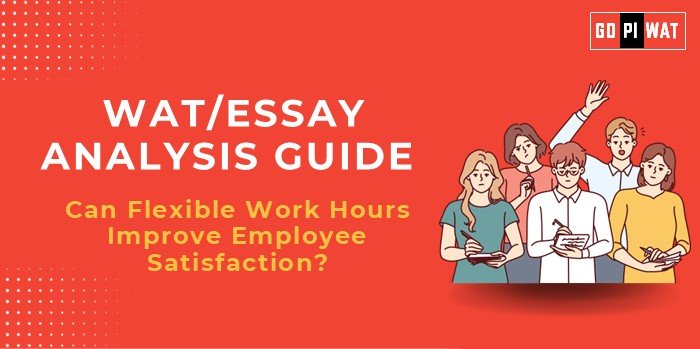📋 WAT/Essay Analysis Guide: Can Flexible Work Hours Improve Employee Satisfaction?
🌐 Understanding the Topic’s Importance
Flexible work hours directly impact workplace happiness, productivity, and talent retention. For B-school applicants, this topic reflects real-world challenges in managing human resources, technology, and work culture transitions.
📝 Effective Planning and Writing
- Time Allocation:
- ⏳ Planning: 5 minutes
- ✍️ Writing: 20 minutes
- 🔍 Reviewing: 5 minutes
- Preparation Tips:
- 📊 Collect data-driven evidence (e.g., Microsoft Japan case study).
- 📋 Note pros (satisfaction, productivity) and cons (accountability, coordination).
💡 Introduction Techniques for Essays
- Contrast Approach:
“While traditional 9-to-5 work schedules were once the norm, flexible work models are reshaping job satisfaction and productivity worldwide.”
- Case-Based Approach:
“Microsoft Japan’s experiment with flexible work hours led to a 40% boost in productivity, showcasing its potential to revolutionize work culture.”
📚 Structuring the Essay Body
- Achievements:
- ✔️ Improved retention (e.g., 30% lower attrition).
- 📈 Enhanced productivity during peak individual performance times.
- Challenges with Comparative Analysis:
- ⚠️ Accountability issues (Netherlands success vs. Japan struggles).
- 🔄 Coordination problems in global teams.
- Future Outlook:
- 🤖 Role of technology in managing flexible hours (e.g., productivity tools).
- 🌍 Increasing global adoption of flexible policies post-pandemic.
✅ Concluding Effectively
- Balanced Approach:
“Flexible work hours have proven to improve satisfaction, but organizations must ensure proper systems to balance autonomy and accountability.”
- Global Perspective:
“As seen in countries like the Netherlands, flexibility can enhance productivity and morale. However, effective implementation is key for long-term success.”
📊 Analyzing Successes and Shortcomings
- 🌟 Key Achievements: Higher satisfaction, lower turnover, and productivity gains.
- ⚠️ Ongoing Challenges: Accountability, coordination, and work-life boundary issues.
- 🌍 Global Context: Best practices from the Netherlands and lessons from Japan’s overwork culture.
💡 Recommendations for Sustainable Progress
- ✔️ Implement result-based performance tracking to address accountability concerns.
- 📏 Promote clear boundaries and downtime policies to ensure work-life balance.
- 💻 Invest in technology tools to streamline communication and collaboration.
✍️ Sample Short Essays
- Balanced Perspective:
“Flexible work hours improve employee satisfaction by offering autonomy and better work-life balance. However, effective policies are needed to address accountability and prevent burnout.”
- Solution-Oriented:
“Flexible work models, when supported by result-based performance systems and technology, can enhance satisfaction while maintaining productivity.”
- Global Comparison:
“The Netherlands’ success with flexible schedules demonstrates its benefits, while Japan’s challenges highlight the need for cultural and systemic shifts to fully realize its potential.”


